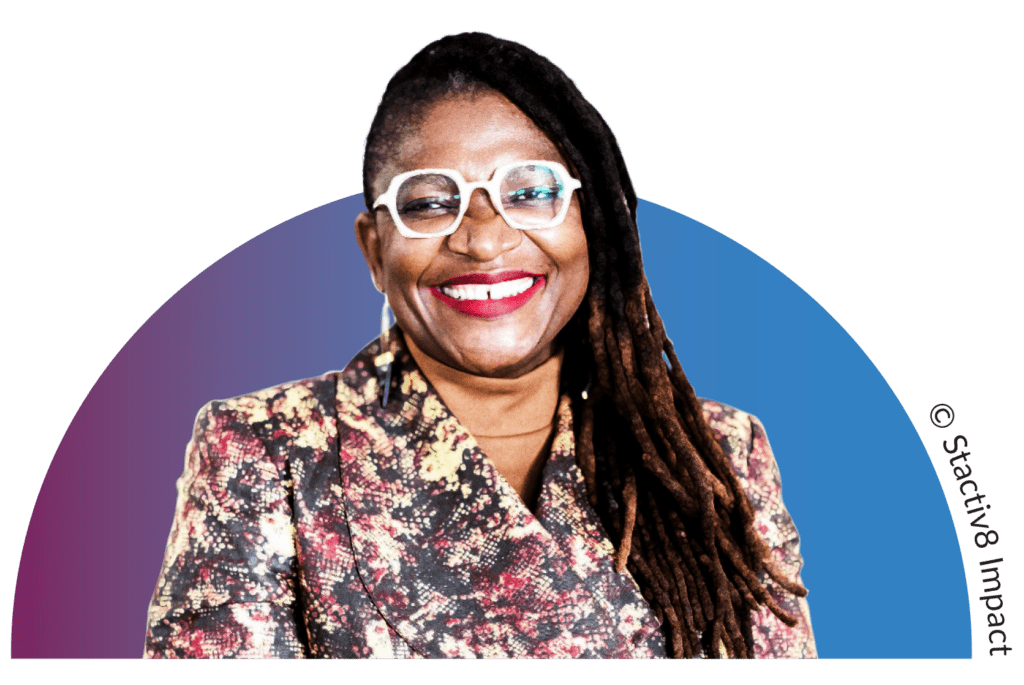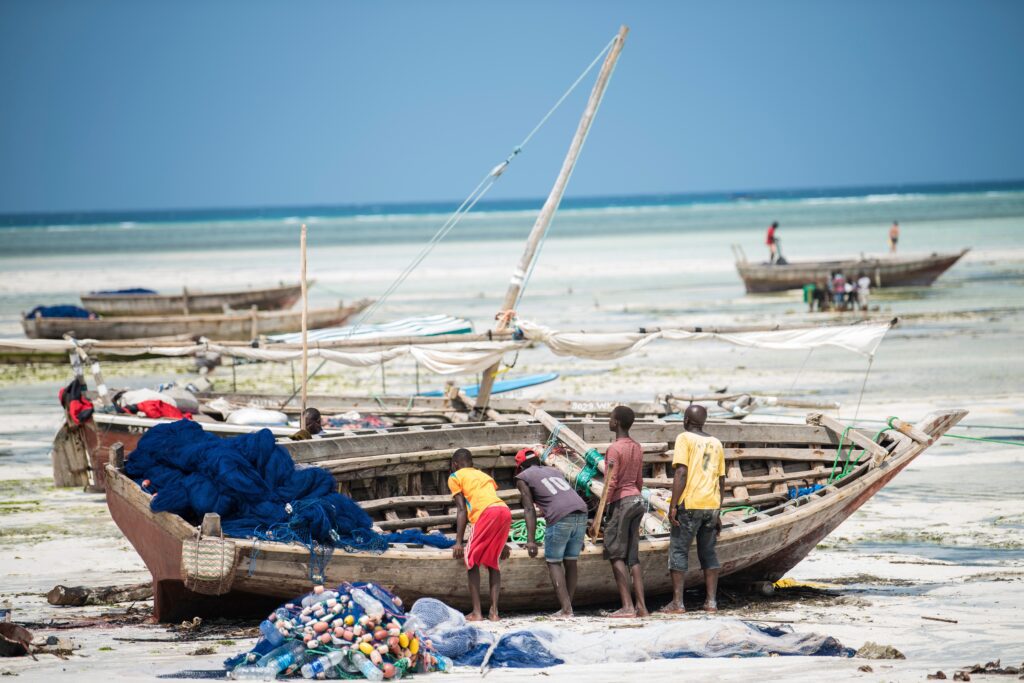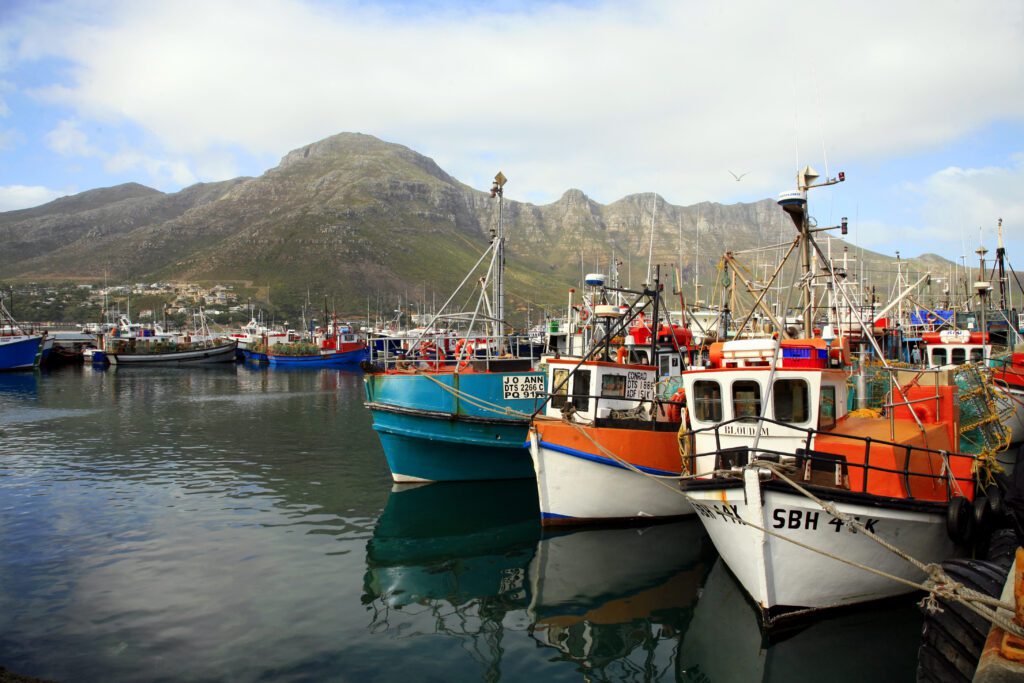April 26, 2022
Q&A: Masego Madzwamuse of the Oak Foundation on environmental policies that also protect people
BY: Emily Nuñez
Masego Madzwamuse was born in Botswana and partly raised in Zimbabwe, with her mother’s side hailing from the Kalahari Desert. She witnessed the ways in which her family’s culture and livelihoods depended on natural resources, so when she started a career in conservation, she was surprised to see the criminalization of local communities in the name of environmental protection.
“It struck me at the time that conservation planning responses were pushing communities to the periphery,” Madzwamuse said. “Environmental planning for protected areas was behaving as though the territories were not occupied, and as if these were territories that human beings and communities did not have a relationship with.”
This emphasis on protecting people — not just places — has informed much of her career as a grantmaker, policy analyst, and advocate for social and economic justice. She was the youngest person and first woman of color to lead the International Union for the Conservation of Nature’s office in Botswana. Later, as CEO of the Southern Africa Trust, she helped strengthen the agency of impoverished populations.
She is now based in Geneva, Switzerland, where she leads the Environment Programme at Oak Foundation, an organization addressing social and environmental issues on a global scale. Oak was one of five organizations that founded Oceana 21 years ago, and it was instrumental in helping Oceana safeguard Belize’s reef and fisheries from the pollution of offshore drilling; protect habitats from destructive bottom trawling in places like the U.S. and EU; and establish marine protected areas (MPAs) in the Philippines and Chile.
In a recent conversation with Oceana, Madzwamuse discussed Oak’s environmental strategy, climate justice, the key to achieving a “blue economy revolution,” and more.

Based on your prior experience with the Southern Africa Trust, what role has climate justice and resiliency played in coastal countries in Southern Africa?
The continent is warming faster than the rest of the world, and natural disasters will continue to devastate African communities and economies. Coastal communities are directly exposed to the risks associated with climate change-induced sea level rise and warming sea temperatures. The immediate environmental impacts include a reduction in fish stocks and an increase in the frequency of natural disasters. Small island states, such as Madagascar, and low-lying coastal areas with large populations, especially in West Africa, are vulnerable to rising sea levels.
Meanwhile, places like Mozambique have also been exposed to an increase in the frequency of extreme weather events. In 2019, Mozambique was hit by consecutive category 5 cyclones Kenneth and Idai, which left widespread devastation and a death toll of 1,300 people in their wake. The loss of life and lasting impacts on the economy and livelihoods could have been avoided with timely interventions from local and regional actors. These are not single events, but trends projected to increase in frequency due to climate change.
Natural disasters are also devastating to the economy. For example, the associated costs of Kenneth and Idai were estimated at 5-10% of gross domestic product (GDP). The World Bank estimates that Mozambique will lose between $600,000 and $1.5 million per year for the next decade. In Tanzania, 1.6 million people living in coastal areas will face devastating climate impacts. The fisheries sector accounts for 35% of employment in rural areas. The numbers are significant when we add close to 4 million people who are involved in the value chain of the fisheries sector — processing, marketing, and others.
Recognizing that natural disasters are likely to worsen, a broader conversation has emerged on disaster preparedness and the need for building community resilience to climate change. This development has a nascent collaboration between climate justice movements and organizations working in the development and human rights space.
In terms of climate justice, we can see clearly through these examples that those who are least responsible for carbon emissions and climate change are most impacted. The capacity to adapt and mitigate the impacts of climate change are not evenly distributed, even in countries with advanced economies such as South Africa. Unfortunately, not enough effort has gone into financing climate adaptation responses. And, even within the mitigation sector, the investments that go to vulnerable regions do not meet the scale of the demand.
These are not new insights but a message that African governments ad civil society movements have delivered repeatedly at various climate negotiations. What is encouraging is we are seeing an emergence of cross-sectoral movements in Mozambique, Madagascar, South Africa, Tanzania, Nigeria, Ghana, and various other parts of the continent. Small-scale fishers and coastal communities are joining the global climate fight and connecting efforts with human rights organizations, labor movements, environmental activists, and other social movements to halt carbon emissions and deliver inclusive climate solutions. Advances in technology and science also make it possible to deliver climate information to coastal communities and governments at reduced costs.

How is Oak engaging with the issue of offshore oil and gas drilling and its contribution to climate change?
This is one of the areas I am excited to work with the team on. The challenge of protecting marine resources in the context of climate change is enormous. It goes beyond building the voice of small-scale fishers.
Oil and gas are the world’s biggest climate challenge, as they represent approximately 40% of global greenhouse gas emissions and 55% of energy-related CO2. Offshore oil and gas are a big part of the problem, as new projects are bigger and riskier, given their placement in deep or ultra-deep waters. In addition to the climate impacts, there are grave marine ecological and social pitfalls associated with the oil and gas industry.
Oak supports accountability in the finance sector to make publicly visible the financing and insurance risks associated with the stranded asset, while holding up other sustainable development and energy options. We also support the development of communications and legal strategies linked to inclusive new production and infrastructure build-out plans.
What is Oak’s position on bottom trawling?
Oak is supporting an active campaign called transform bottom trawling which has four main calls to action:
- Strengthen national inshore exclusion zones for small-scale fishers
- Prohibit bottom trawling in all MPAs
- End harmful subsidies to bottom trawlers while supporting a fair and just transition for all those affected
- Prohibit the expansion of bottom trawling to new areas
The campaign is supported by a broad coalition of actors, including Oceana. We know Oceana has been active in this area for decades and we are excited to have them as a partner in this work, especially in Brazil and Alaska.
In South Africa, there are 22 commercial fisheries, including four trawl fisheries. In a current project Oak is supporting, the partners will assess and document the inshore trawl fisheries and the small-scale fisheries in South Africa to understand their carbon footprint, and the impacts and interactions of bottom-trawl fisheries with the other inshore fisheries. The intention is to promote legal mechanisms to restrict inshore trawling in some areas through fishery management areas or inclusion in new/expanded MPAs.
Apart from southern Africa, much of the destructive impacts of distant-water fishing on coastal communities we see in West Africa involve bottom trawling. Oak is supporting a number of active projects in the region to advance policies and regulations that would ban these practices, especially in inshore exclusive zones designed to protect access for small-scale fisheries and increase overall transparency in the fisheries sector.
You’ve spoken about how South Africa has the highest wealth inequality in the world, as well as high rates of food insecurity and unemployment. It is also one of the top 30 fishing countries in the world. How can the country best leverage its rich marine resources to address inequality, food insecurity, and unemployment?
Income inequality is persistent in many parts of the world and gets to the heart of the structural drivers of vulnerability. Oxfam draws our attention to the fact that over the last three years the world’s 10 richest people more than doubled their fortunes from $700 billion to $1.5 trillion. In that same timeframe, over 160 million more people have been pushed into poverty. These figures, while staggering, might seem distant. The implications become clearer when we think about what is happening within countries and communities.
At the height of the pandemic, artisanal fishers in the coastal areas of South Africa had to rely on food parcels and social grants to get by. They could not cash in on the export-oriented fisheries sector. Worldwide lockdowns caused widespread decline in the demand, catch, and supply of fish. It resulted in disruption to the life and livelihoods of fishers. In addition, the crew on small vessels found it impossible to follow sanitary measures, including physical distancing, which increased the chances of the virus spreading.

As a result of these issues, many people have lost their livelihoods in various parts of the world. In India, for example, fishers lost income of up to INR 100,000 (USD $1,300), and 25% suffered moderate to severe psychological impact and anxiety due to COVID (Das et al. 2022). Although these issues require responses from governments, civil society has a role to play here. For example, one of Oak’s grantees mobilized resources to assist fishers with direct cash transfers, food, and other support during this particularly difficult period.
The impacts of the pandemic compounded pre-existing inequalities and policy failures around the world. For example, in South Africa, the blue economy could contribute 177 billion Rands (USD $12.2 billion) to the economy if managed well. That is more than three times what its share of the economy was in 2010.
However, this potential would not mean much for the livelihoods of small-scale fishers without changes that reverse the legacy of discriminatory policies. The legislative framework under apartheid recognized only commercial and recreational fishers, criminalizing the livelihood activities of small-scale fishers. Unfortunately, the small-scale fishers continue to have unequal access to marine resources and policies could be improved. There is great potential for change if civil society, governments, and fisheries work together to improve policies that will enable small-scale fishers to benefit from the blue economy.
To address food insecurity and inequality and protect livelihoods, we need to protect coastal marine resources from a range of threats, including offshore oil and gas and destructive bottom trawling, particularly for artisanal fishing communities. Oak has active grants with several South African organizations, and partners in Ghana, Tanzania, Nigeria and other parts of the continent and the world, to help address a range of threats and support small-scale fishers.
What are you most looking forward to achieving as Oak’s Environment Programme Director?
Our discussion so far has focused on the conditions in Africa, but the Environment Programme is global in nature. I look forward to working with my colleagues and our partners to tackle these issues in many parts of the world. The blue economy is central to how we bring about a just, equitable, and sustainable food system. Today’s global food system is failing both people and the planet.
As resources on land diminish and the global population expands, the oceans are viewed as a limitless new frontier for resources such as energy, minerals, and food. There is a race by policy and private sector initiatives to scale up blue food production for healthy diets; however, little is known of the environmental limits of such scaling and there is little indication that mankind is prepared to learn from the mistakes on land. On the other hand, coastal communities compete with powerful corporations for the same resources.
An alternative future and blue economy revolution is possible. Such a revolution would not only consider the economic wealth and ecological sustainability of development in our oceans. It would retain the benefits which small-scale fisheries provide to society in terms of food and nutrition security, livelihoods, and social justice.
In a 2019 study, researchers Philippa J. Cohen et al. suggested that a revolution would improve representation of small-scale fishers in international, national, and multi-stakeholder policy arenas. It would advance a broader suite of ocean and fisheries governance solutions, including those that maintain traditional systems of communal or common property resources management. The voice of small-scale fishers would sit alongside other ocean users, and they would be recognized as the primary rights holders to whom ocean governance should be accountable. Now that would be a revolution!
“An alternative future and blue economy revolution is possible. … The voice of small-scale fishers would sit alongside other ocean users and they would be recognized as the primary rights holders to whom ocean governance should be accountable. Now that would be a revolution!”
– Masego Madzwamuse
We recognize that little progress will be made if environmental organizations, government, and industry work on these issues on their own. I look forward to supporting our team to connect labor rights groups, human rights, Indigenous peoples, and campaigners focused on the marine environment. We know that building coalitions for social change takes time but is necessary given the scale of the challenge we face. It is important for us to root our efforts in principles of social justice. That way we can achieve deep and lasting transformation for all.
Oak recently helped fund an international Blue Food Assessment. What changes would Oak like to see within global food systems, particularly as it relates to the oceans?
We would like to see a global food system that recognizes small-scale producers and local custodians of the natural resources upon which our economies and healthy environments depend. The livelihood conditions of small-scale fishers, for instance, need to improve. Small-scale fishers make up an estimated 90% of the 100 million fisheries workers in the world. Their catch comprises at least a third of the global wild-caught fish harvest that, in combination with aquaculture, provides up to 20% of protein for human consumption on an annual basis. However, they don’t get an equitable share of the benefits. For example, of the $35.4 billion invested in global fisheries subsidies in 2018, only 19% went to small-scale fishing, including artisanal and subsistence fisheries. More than 80% went to industrial fishing.
Aquatic or blue foods are not a major part of the global food systems conversation, and issues important for small-scale fishers and coastal communities are not given adequate attention and priority. For example, the encroachment on traditional fishing grounds by bottom trawlers, oil and gas projects, shipping, aquaculture projects, and other coastal activities proliferate. From a human health point of view, there is also not a full appreciation of the nutritional qualities of different types of blue food and how human health benefits and risks differ across these types. An understanding of this is critical for coastal communities, especially in developing countries.
Oak wants to see a just, equitable, and sustainable food system — one in which we rebalance meat consumption, transform the wild food supply chain, and promote a real blue economy in which seafood is allowed to recover and be harvested sustainably, ensuring the food security of coastal and Indigenous communities.
A condensed version of this interview appeared in the Climate Issue (Spring 2022) of Oceana Magazine. Read it online here.



